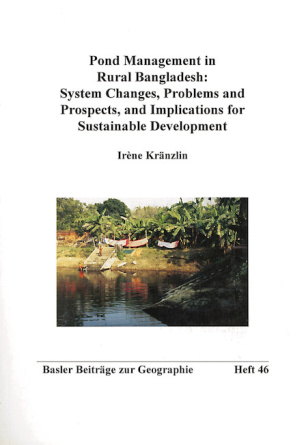
Herausgegeben von Rita Schneider-Sliwa
Bd. 46 Irène Kränzlin (Hg.)
Pond Mangement in Rural Bangladesh: System Changes, Problems and Prospects, and Implications for Sus
“[…] The Main objective of the study was to explore the importance of the traditional water resource pond in Bangladesh and its relevance for a future water sector policy in the country. The core of the research problem was a critique of the technocratic water policy, focusing on the introduction of the tubewell technology. Today, 96% of the population of Bangladesh drinks groundwater from tubewells. However, the target of the Government, the reduction of the incidence of diarrhoeal diseases, could not be achieved. Furthermore, due to an increasing extraction of groundwater by deep tubewells for irrigation the water table is constantly declining. It can be assumed that there may be a connection between the excessive extraction of groundwater and the disastrous arsenic contamination of the groundwater in the country. […]
A review of development theories over the past 50 years gives the theoretical framework of the study. The effects of capital- and technology-intensive development projects were outlined, taking the example of the tubewell introduction to Bangladesh and its effects on traditional pond management. In order to analyse the changes in pond management the integrative system approach, a working instrument in recent social geography, was used. The structural and functional changes of pond management over time were described and explained considering space as a product of human action. […]
The explorative character of the study required a flexible research design. Due to an actor- and process orientation of the research an idiographic approach using mainly qualitative methods was needed. Besides several types of interviews, some quantitative methods were also used, such as water quality tests and mapping. Literature review and statistical analysis provided primary and supplementary information. According to the research design a case-study of one village was undertaken and later complemented with a short comparative study in two additional villages. […]”
Bevorstehende Veranstaltungen
Bibliographische Angaben
| Reihe | Basler Beiträge zur Geographie |
|---|---|
| Seitenanzahl | 213 arabisch |
| Zeichnungen | 3 |
| Abbildungen | 35 s/w |
| Tabellen | 8 |
| Bindung | Buch, Broschiert |
| ISBN | 978-3-7965-2376-2 |
| Erscheinungsdatum | 01.01.2000 |